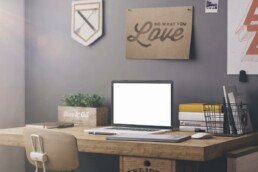What Happens When We Become Organized?
The things we keep in our workspace/office exposes what we decided will enhance our career, job, expertise, life, or business. When papers pile up or are dumped unsorted in boxes, this is an indication these items no longer serve you.
Getting organized will help you take back control. Until then, colleagues or spouses may think your workspace’s mess reflects your state of mind. “I know where everything is,” you’ll retort. “I can always find what I need.”
The problem is you won’t always be around to find a project or file due to a hospital stay, vacation, sick day, or out-of-town conference.
If you lose important papers or electronic files, you cannot pass on important knowledge, keep the information for company records or history, or find what you or others need.
When information gets missed, productivity and the company can suffer.
You know getting organized helps you, but did you know it will boost your work financially, emotionally, physically, and spiritually? See how below:
Financial Benefits
- Only keeping what you really need compels you to focus on projects and goals you value most — allowing you to better meet company goals and faster
- A cleared space leads to increased productivity, and a more profitable employee
- By organizing supplies, avoid repurchasing those you have (save money!) and allows you to plan what you need in the next supply order
- Instead of wasting time looking for files, you can spend your time effectively by being a more productive employee
Emotional Benefits
- Feels like huge weight lifted off you (“I must get to this” is now done)
- Seeing what’s really important to you may inspire you to pursue new projects, or a new role
- Lift away that guilty awareness that your space is cluttered
- With a cleared space, you clear your mind
- Each morning, instead of starting your day with frustration at the clutter and disorganization, you are ready to work on your newly identified goals
- Clearly see what is truly important to you at this stage of your career or business
- Become more passionately involved or feel recommitted to work
- Gain renewed confidence in decision-making abilities
- By confronting what we no longer need, we get to reset our work lives
- Make decisions based on newly identified values
Physical Benefits
- Spend less time searching for files or projects
- Reduce stress and feel less overwhelmed
- Find things you’ve been looking for
- Have room and feel comfortable to host meetings in your office
- Tackle projects hanging over your head untouched, ignored, or hidden
- Face your tendency to procrastinate
- By reducing files, have more room to work
- Digitize old files and that tower of business cards you won’t use
- Easy-to-maintain system, reflecting the individual personal work style, helps spaces stay clear, and productivity remain high
- Stand or sit at your desk properly, with an ergonomic computer set up, helping to reduce neck or lower back pain
- By selecting what you keep, make choices and decisions on your future
- With boxes gone, you have a clear path to your desk
- Organized files are at hand when you need them
Spiritual Benefits
- Organizing your work space can be reputation-enhancing, as colleagues and clients see you in control of your workflow
- Learning to let material go and giving away, recycling, and archiving files or items can be cathartic, leaving you with a feeling of freedom
- Items in your office are signs of what you value, and a reflection of what you want to get out of your career
- By digging out from stuff that has been burying you, you can forge ahead uncluttered, ready for change
- Feel ready to tackle projects you couldn’t bear to look at before
- Be more passionately involved and able to focus on what matters most
Paper Piles & Digital Disorganization Can Cost You
Some people embrace clutter. They love their messy office. They know exactly what’s in each and every one of their 27 piles of paper littering the desk, floor, windowsill, and credenza. ‘Go ahead and test me. I know what’s there,’ they say confidently.
Their computer desktop is littered with dozens of unsorted files. Their inbox holds emails in the tens of thousands. Maybe more than 100,000.
But what if that person has the flu, or is working in another time zone for a week. If they weren’t able to get to a computer or phone for a few days, would a colleague be able to find what they need in that messy office?
What if you were out longer, such as a serious illness or injury for a few months. Would it be intuitive for your colleagues to know where to access files, either in your office or on your electronic directory? Could they find everything to take over the project?
Here’s the thing: you may know where everything is, but no one else will understand your system. All they see is a high pile of paper leaning dangerously to the left. Or blocking the heating vent.
If they are allowed access to your digital files, your piles likely won't make sense to them. If files are buried in a system only you can understand, that spells trouble for the company.
When you hear someone say they know where everything is, ask if they have room on the desk to read, make notes, or edit a document. Is there space for water, a coffee cup, to review a file? Are several projects in one tall leaning-tower-of-Pisa style stack? That is probably not serving them well and could be a safety hazard.
And it costs.
Not being able to have clients in your office, or looking unprofessional if you do, affects your professional reputation. It looks like you aren’t in control. People wonder if the way you approach work is the same -- unkept and ignored.
Above all, it costs the company or your business by not sharing information with colleagues or clients on a regular basis.
it’s impossible for anyone else to know your system. If you have one. And if you don’t, I encourage employees and small business owners to file, have a spot for current projects, and archive those long over and complete, rather than let them sit in your office gathering dust. You’ll all benefit.
Heard About Swedish Death Cleaning?
While people around the world embrace Marie Kondo’s method of what sparks joy to declutter, those into their 50s and beyond are practicing the Swedish Death Cleaning method (SDC) or döstädning. In Swedish, dö is "death" and städning is "cleaning."
Sounds downright scary doesn’t it? I mean it has the word “death” in it.
The SDC philosophy is all about editing out unnecessary objects and clutter in your home over time to be left with only what's useful or a good memory. You slowly edit out items before your children or loved ones have to do it for you after you’ve died.
It’s the ultimate plan to be organized, but after death.
Although SDC advocates say clean it up now, it is really a philosophy of living.
It can start anytime, ideally in your 50s, beginning with small steps that involves organizing and purging out stuff daily, getting down to a minimum, and leaving behind a decluttered home.
While people have been scrutinizing their relationship with stuff lately, this method has been around for about two years, practiced by an aging generation.
From their 20s to 60s, the Baby Boomer Generation made good salaries, bought inexpensive homes, cars, and spent their wealth during the extravagant 1980s. All this stuff now packs their homes.
And many of those born in the 1940s, brought up in wartime, know what it is to lack. Therefore, many keep things that may come in handy. This can get out of control.
I’m generalizing here, but through either experience described above, many Baby Boomers have become collectors. They have stuff. And they expect their offspring will want it when they are gone.
Not so fast.
Their children are Generation Xers, and they have enough stuff. Excellent consumers, they can buy lots with cheap manufacturing, and as a result, have tons of clothes, furniture, and electronics. And now with online shopping, it's even easier to make our consumerism easier, faster, and more efficient.
They are collectors too. But also discarders.
Gen Xers get rid of their stuff in search of getting a better, updated, newer version.
Bottom line is most likely, Gen Xers won't want all your stuff.
Not that everything has to go. The SDC minimalist lifestyle still means you keep items that may have sentimental value to you or relatives. The point is that whatever’s left is not a burden on the family someday. Or you.
That gives SDC followers time to travel, watch movies, go to the theatre, or create elaborate meals. This is how priorities shift, when you spend less time shopping, collecting, and taking care of what you own.
When you think about it, Swedish Death Cleaning gives you more time to enjoy life. I like that.




